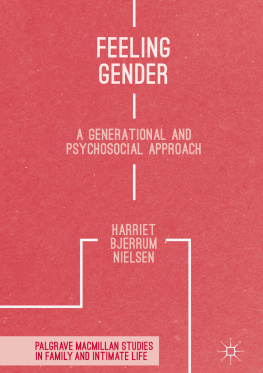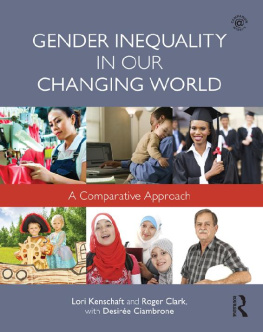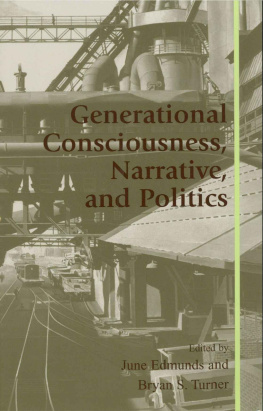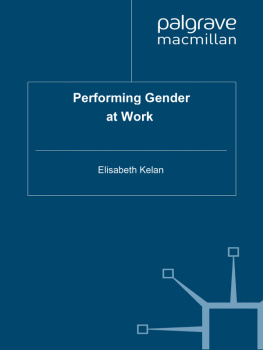1. Feelings and the Social Transformation of Gender
Feelings of gender at different times and places are a relatively neglected aspect of the social transformation of gender.). Feelings integrate past experiences as they are shaped over time through a specific biography, and they make imprints of the future as they are part of a persons capacity to act and infuse life choices with personal meaning. Feelings are personal, but they are also thoroughly social since they are created in social contexts and social institutions in a given historical period. In this way, feelings can be seen as a central psychosocial link.
Feelings as Social
Erik H. Erikson, one of the first psychoanalysts to take an interest in the intertwinement of subjectivity and culture, says that people who share a historical era, class or ethnicity are guided by common images of the world, but that these images also take a specific individualised form in every person: Infinitely varied, these images reflect the elusive nature of historical change; yet in the form of contemporary social models, of compelling prototypes of good and evil, they assume a decisive concreteness in every individuals ego development (Erikson : 9). This includes, I would add, the dynamics of change of this social order.
My concern in this book is that the social transformation of gender also involves the work of feelings. Gender attains emotional meaning through the life course and in the transmission between generations at a particular time. I want to explore the link between generational transition and the negotiations and calibrations between women and men belonging to the same generation. To understand this dimension of social change, we must look into subtle and gradual historical processes working on the level of gender identities and gendered subjectivities, including motivations/capacities for autonomy in women and emotional intimacy in men, which may have provided a psychological readiness for structural and cultural changes and political interventions. The empirical basis for the analysis is a longitudinal research project that explores the feelings of gender across three generations of a sample of white, heterosexual women and men of different class backgrounds as they moved from childhood and youth to adult life, and what impact these feelings had on changing gender practices. New life projects gradually came into being, not only as outcomes of externally imposed norms, but also as the work of subjective feelings of gender.
The personal and the social are often thought of as complementary, mirroring the academic disciplines of psychology and sociology, as if individuals could exist without a society or a society could emerge without individuals thinking, feeling and acting in certain ways. The mutual and dynamic character of the process in which both societies and individuals come into being makes it meaningless to use the word social as a contrast to the personal or the cultural. Conceiving of the social or the societal as a totality that may be differentiated and expressed in many different forms seems to be a more fruitful approach. Such forms should neither be radically separated nor levelled out and reduced to each other. As the American anthropologist Michelle Z. Rosaldo once wrote, even though culture and personality cannot be separated, culture is not personality writ large, nor is personality culture in miniature (Rosaldo and Lamphere : 59). In accordance with this, I understand feelings as a specific kind of social activity that takes place in persons, but not in isolation from other kind of experiences, other persons, other kinds of social activities or the historical situation. By analysing the meanings and feelings that are generated through the gendered practices of three generations and trying to understand how each generation strives to find ways to do gender that feel right in terms of their experiences, desires and circumstances, I seek ways to think about the inner and the outer world, desire and reality, structure and agency, and the subject and the object in ways that do not start out by separating them.
Gender Relations in a Process of Change
The life times of the three generations analysed in this book coincide with huge structural and cultural changes in gender relations in the Western world and beyond. There has been a sea change in the gender-normative assumptions about who cares and who works, who deserves what kind of rights and protection (Kessler-Harris ).
All this has had a significant impact on the gendered division of labour in society as a whole, but has evidently not eradicated all inequalities in womens and mens responsibilities, opportunities and privileges in work and family. Cross-nationally we find persistent gender gaps with regard to pay, work hours and career tracks (Crompton et al. ).
Seen from a birds-eye view, these changes in gender relations and family models must be understood with reference to broader historical processes of modernisation and modernity, and the way in which these processes have materialised in different national contexts. Processes of industrialisation, urbanisation, education and secularisation have had a profound impact on gender relations, class relations and generational relations. This development has increased trends of individualisation where the self and society are understood at large as reflexive projects and where standard biographies have become elective biographies (Beck and Beck-Gernsheim ). An example of the intertwinement of individualisation and gender from my study is the shifting relationships between mothers and daughters: as young women, the oldest generation of rural women felt it to be self-evident that their duties to their parents had an absolute priority over their own inclinations to take up paid work. They would have felt like bad people if they had let their parents down. However, in the middle generation a rural mother who asks her young daughter to stay at home and help out may elicit self-pity or even rage in the daughter, and the daughter does not feel like a bad person at all. She feels she has the right to her own life. In the youngest generation the idea that the daughter should stay at home and help out is close to unthinkable both for mothers and daughters, and therefore not emotionally charged in the same way as for the two older generations. Here the young daughter would instead feel like a bad person if she did not pursue a good education and become independent of her parents, as successful young women should. The example also lends support to the claims that personal bonds are not dissolved, but rather transformed in this process, and that the process is not guided only by reflexive considerations.
Processes of modernisation are dependent on timing and the particular route from agrarian to industrial society, as well as the roles that various social groups have played in this (Duncan ).
Gender Contracts and Agency
The changing work and family articulations may be seen as expressions of shifts in broader societal gender contracts (Hirdman ).
The gender contract frames the ways in which women and men are integrated in society. It accentuates the reproductive force in a given hegemonic social and cultural order, working as the unnoticed background against which gender arrangements are negotiated and decided upon. However, the concept may also open up for an understanding of gender arrangements as complex and variable historical outcomes of many interacting societal processes. In this way it also leaves room for agency.). Such reciprocal interchanges in daily life do not only rely upon perceptions and reflexions, but also involve feelings of gender: What kind of personal experiencesunderstood as feelings, meanings and practiceswere behind the increasing support of the change in the gendered division of work in the family and beyond? By looking into how practices, meanings and feelings of gender are reconfigured over time and how such micro histories Walkerdine (2012: 86) contribute to the larger history of the development of new gender contracts, we may gain more insight into the mutual dynamics between structural, political, cultural and psychological change. Since the concept of feeling incorporates meaning and process, it may in some respects be better suited to comparison over time and place than more specific and isolated dimensions of behaviour like womens employment patterns or changes in dominant family models, which say little about the underlying processes or the context of the phenomena.







